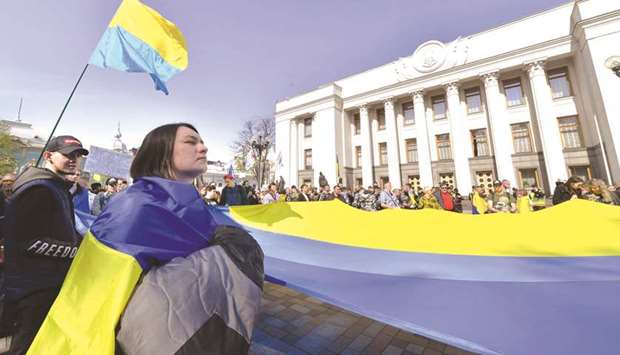Ukraine’s parliament approved a law yesterday that grants special status to the Ukrainian language and makes it mandatory for public sector workers, a move Russia described as divisive and said discriminated against Russian-speakers.
The law, which obliges all citizens to know the Ukrainian language and makes it a mandatory requirement for civil servants, soldiers, doctors, and teachers, was championed by outgoing President Petro Poroshenko.
He is expected to sign it into law before he leaves office in coming weeks after losing re-election on Sunday to Volodymyr Zelenskiy, an actor who mainly speaks Russian in public.
Ukrainian is the predominant language in western Ukraine, while Russian is predominant in much of the east.
Both languages are spoken widely in the capital Kyiv, and a large proportion of the population speaks both fluently.
Television is often bi-lingual, with talk show hosts and their guests slipping between the two languages, sometimes asking questions in one and answering them in another.
Language has become a much more sensitive issue since 2014, when a pro-Russian president was toppled in a popular revolt and Russia responded by annexing the Crimea region and backing a pro-Russian separatist uprising in the east.
The separatists argued in part that easterners were victims of growing discrimination against Russian-speakers.
Some Ukrainian-speakers argue that the prominence of Russian is a legacy of the Soviet era that undermines Ukraine’s identity.
On Wednesday, Russian President Vladimir Putin signed an order simplifying the procedure for obtaining a Russian passport for residents of eastern Ukraine’s rebellious regions, prompting calls from Kyiv for more international sanctions.
Poroshenko put promotion of the Ukrainian language at the heart of his unsuccessful re-election campaign.
Zelenskiy, who played a schoolteacher-turned-president in a Russian-language comedy series on Ukrainian TV before launching his political career, said yesterday that his team would examine the new law to see if the rights of all citizens were respected.
“We must initiate and adopt laws and decisions that consolidate society, and not vice versa,” he wrote on Facebook.
Zelenskiy said the draft law’s origins during the electoral cycle “made it hostage to political rhetoric”, adding that it was hard to predict the consequences of adopting the law.
Maria Zakharova, a spokeswoman for Russia’s ministry of foreign affairs, said that the new law would deepen divisions within Ukrainian society and impose severe limitations, including in some cases bans, on the use of Russian in Ukrainian public life.
Viktor Medvedchuk, a prominent figure in Ukraine’s Russia-friendly opposition, said it violated the constitutional rights of millions of Ukrainian Russian-speakers.
The new legislation requires TV and film distribution firms to ensure 90% of their content is in Ukrainian and for the proportion of Ukrainian-language printed media to be at least 50%.
Computer software must also have a Ukrainian-language interface, although the law also allows the use of English or any other official language of the European Union.
Lawmakers gave a standing ovation after the law was passed and sang the national anthem.
Hundreds of people with Ukrainian flags had gathered outside parliament to support the law.
“This is a historic moment, which Ukrainians have been awaiting for centuries, because for centuries Ukrainians have tried to achieve the right to their own language,” one of the authors of the bill, Mykola Knyazhytsky, said before the vote.
The make-up of the parliament has not changed since Zelenskiy’s election win and remains dominated by a coalition supportive of Poroshenko.

People hold a giant Ukrainian flag during a rally in front of the Ukrainian parliament in Kyiv, as lawmakers voted on a law enforcing the use of Ukrainian in official settings.
